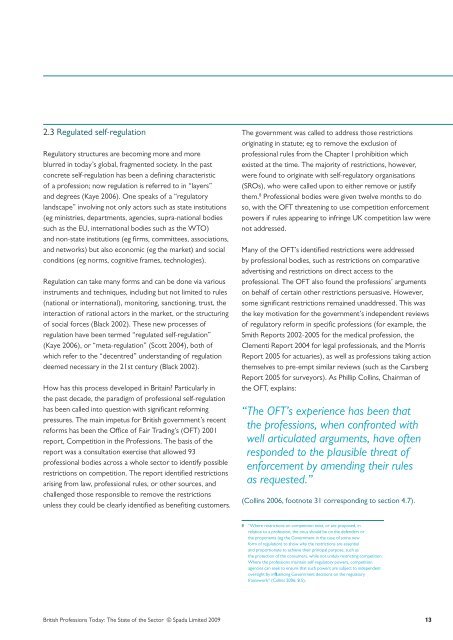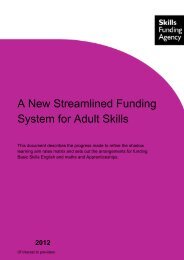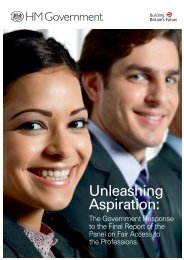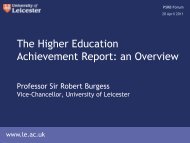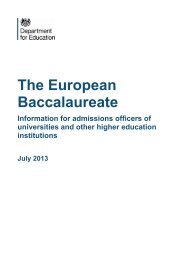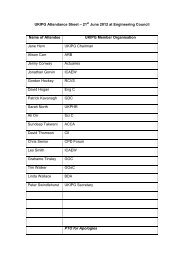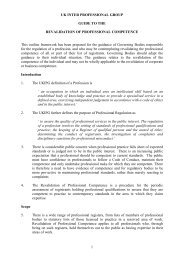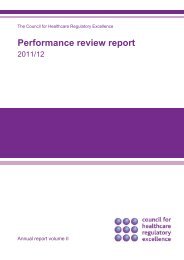BRITISH PROFESSIONS TODAY: THE STATE OF ... - Property Week
BRITISH PROFESSIONS TODAY: THE STATE OF ... - Property Week
BRITISH PROFESSIONS TODAY: THE STATE OF ... - Property Week
Create successful ePaper yourself
Turn your PDF publications into a flip-book with our unique Google optimized e-Paper software.
2.3 Regulated self-regulation<br />
Regulatory structures are becoming more and more<br />
blurred in today’s global, fragmented society. In the past<br />
concrete self-regulation has been a defining characteristic<br />
of a profession; now regulation is referred to in “layers”<br />
and degrees (Kaye 2006). One speaks of a “regulatory<br />
landscape” involving not only actors such as state institutions<br />
(eg ministries, departments, agencies, supra-national bodies<br />
such as the EU, international bodies such as the WTO)<br />
and non-state institutions (eg firms, committees, associations,<br />
and networks) but also economic (eg the market) and social<br />
conditions (eg norms, cognitive frames, technologies).<br />
Regulation can take many forms and can be done via various<br />
instruments and techniques, including but not limited to rules<br />
(national or international), monitoring, sanctioning, trust, the<br />
interaction of rational actors in the market, or the structuring<br />
of social forces (Black 2002). These new processes of<br />
regulation have been termed “regulated self-regulation”<br />
(Kaye 2006), or “meta-regulation” (Scott 2004), both of<br />
which refer to the “decentred” understanding of regulation<br />
deemed necessary in the 21st century (Black 2002).<br />
How has this process developed in Britain? Particularly in<br />
the past decade, the paradigm of professional self-regulation<br />
has been called into question with significant reforming<br />
pressures. The main impetus for British government’s recent<br />
reforms has been the Office of Fair Trading’s (<strong>OF</strong>T) 2001<br />
report, Competition in the Professions. The basis of the<br />
report was a consultation exercise that allowed 93<br />
professional bodies across a whole sector to identify possible<br />
restrictions on competition. The report identified restrictions<br />
arising from law, professional rules, or other sources, and<br />
challenged those responsible to remove the restrictions<br />
unless they could be clearly identified as benefiting customers.<br />
The government was called to address those restrictions<br />
originating in statute; eg to remove the exclusion of<br />
professional rules from the Chapter I prohibition which<br />
existed at the time. The majority of restrictions, however,<br />
were found to originate with self-regulatory organisations<br />
(SROs), who were called upon to either remove or justify<br />
them. 8 Professional bodies were given twelve months to do<br />
so, with the <strong>OF</strong>T threatening to use competition enforcement<br />
powers if rules appearing to infringe UK competition law were<br />
not addressed.<br />
Many of the <strong>OF</strong>T’s identified restrictions were addressed<br />
by professional bodies, such as restrictions on comparative<br />
advertising and restrictions on direct access to the<br />
professional. The <strong>OF</strong>T also found the professions’ arguments<br />
on behalf of certain other restrictions persuasive. However,<br />
some significant restrictions remained unaddressed. This was<br />
the key motivation for the government’s independent reviews<br />
of regulatory reform in specific professions (for example, the<br />
Smith Reports 2002-2005 for the medical profession, the<br />
Clementi Report 2004 for legal professionals, and the Morris<br />
Report 2005 for actuaries), as well as professions taking action<br />
themselves to pre-empt similar reviews (such as the Carsberg<br />
Report 2005 for surveyors). As Phillip Collins, Chairman of<br />
the <strong>OF</strong>T, explains:<br />
“ The <strong>OF</strong>T’s experience has been that<br />
the professions, when confronted with<br />
well articulated arguments, have often<br />
responded to the plausible threat of<br />
enforcement by amending their rules<br />
as requested.”<br />
(Collins 2006, footnote 31 corresponding to section 4.7).<br />
8 “Where restrictions on competition exist, or are proposed, in<br />
relation to a profession, the onus should be on the defenders or<br />
the proponents (eg the Government in the case of some new<br />
form of regulation) to show why the restrictions are essential<br />
and proportionate to achieve their principal purpose, such as<br />
the protection of the consumers, while not unduly restricting competition.<br />
Where the professions maintain self-regulatory powers, competition<br />
agencies can seek to ensure that such powers are subject to independent<br />
oversight by infl uencing Government decisions on the regulatory<br />
framework” (Collins 2006; 8.5).<br />
British Professions Today: The State of the Sector © Spada Limited 2009 13


